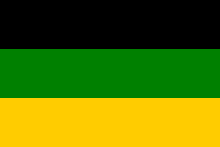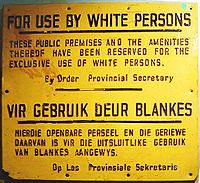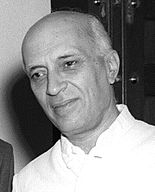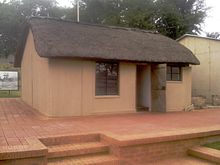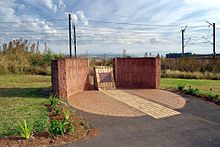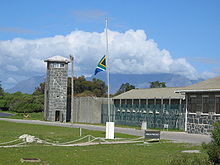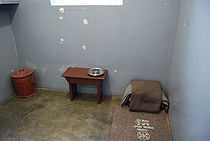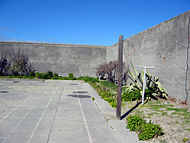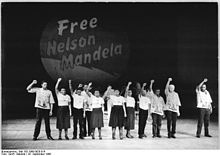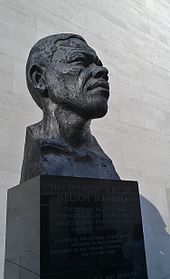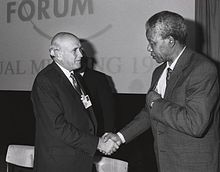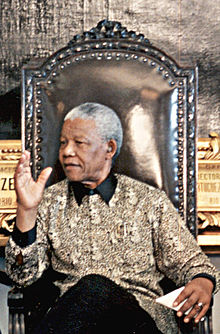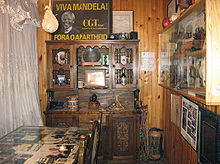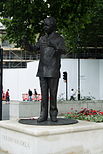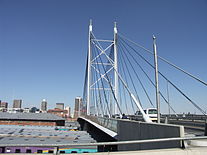
Nelson Mandela
About this schools Wikipedia selection
SOS Children has tried to make Wikipedia content more accessible by this schools selection. SOS mothers each look after a a family of sponsored children.
| His Excellency Nelson Mandela OM AC CC OJ GCStJ QC GColIH RSerafO NPk BR MRCSI |
|
|---|---|
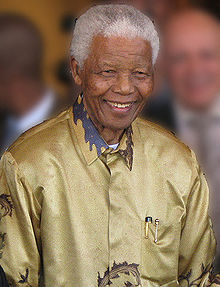 |
|
| Mandela in May 2008 | |
| President of South Africa | |
| In office 10 May 1994 – 14 June 1999 |
|
| Deputy | Thabo Mbeki F. W. de Klerk |
| Preceded by | F. W. de Klerk |
| Succeeded by | Thabo Mbeki |
| Secretary General of Non-Aligned Movement | |
| In office 2 September 1998 – 14 June 1999 |
|
| Preceded by | Andrés Pastrana Arango |
| Succeeded by | Thabo Mbeki |
| Personal details | |
| Born | Rolihlahla Mandela 18 July 1918 Mvezo, South Africa |
| Nationality | South African |
| Political party | African National Congress |
| Spouse(s) | Evelyn Ntoko Mase (1944–1957) Winnie Madikizela (1957–1996) Graça Machel (1998–present) |
| Children | Madiba Thembekile Makgatho Lewanika Makaziwe Maki Zenani Zindziswa |
| Residence | Houghton Estate, Johannesburg, Gauteng, South Africa |
| Alma mater | University of Fort Hare University of London External System University of South Africa University of the Witwatersrand |
| Religion | Christianity (Methodism) |
| Signature |  |
| Website | www.nelsonmandela.org |
Nelson Rolihlahla Mandela ( Xhosa pronunciation: [xoˈliːɬaɬa manˈdeːla]; born 18 July 1918) is a South African anti-apartheid activist, revolutionary and politician who served as President of South Africa from 1994 to 1999, the first to be elected in a fully representative, multiracial election. His administration focused on dismantling apartheid's legacy, and cutting racism, poverty and inequality. Politically a democratic socialist, he served as president of the African National Congress (ANC) political party from 1991 to 1997. Internationally, Mandela was the Secretary-General of the Non-Aligned Movement from 1998 to 1999.
A Xhosa born to the Thembu royal family, Mandela attended Fort Hare University and the University of Witwatersrand, studying law. Living in Johannesburg townships and becoming involved in anti-colonial politics, he joined the ANC, becoming a founding member of its Youth League. When the white supremacist National Party government implemented apartheid in 1948, he rose to prominence in the ANC's 1952 Defiance Campaign, being elected president of the Transvaal ANC branch and overseeing the 1955 Congress of the People. Working as a lawyer, he was repeatedly arrested for seditious activities and with the ANC leadership stood on the Treason Trial from 1956 to 1961. Although initially committed to non-violent protest, in association with the South African Communist Party he co-founded the militant Umkhonto we Sizwe (MK) in 1961, leading a bombing campaign against government targets. In 1962 he was arrested and convicted of sabotage and conspiracy to overthrow the government, being sentenced to life imprisonment.
Mandela served time doing hard labour in Robben Island and then Pollsmoor Prison, while an international campaign lobbied for his release, which was granted after 27 years in 1990. Becoming ANC president, Mandela wrote his autobiography, and led negotiations with President F.W. de Klerk to abolish apartheid and establish multi-racial elections in 1994, in which he led the ANC to a landslide victory. As president, he created a new constitution and initiated the Truth and Reconciliation Commission to investigate past human rights abuses, while introducing policies aimed at land reform, combating poverty and expanding healthcare. Internationally, he acted as mediator between Libya and the United Kingdom in the Pan Am Flight 103 bombing trial, and oversaw a military intervention in Lesotho. Refusing to run for a second term and succeeded by his deputy Thabo Mbeki, Mandela became an elder statesman focusing on charitable work in combating poverty and HIV/AIDS through the Nelson Mandela Foundation.
Mandela has received international acclaim for his anti-colonial and anti-apartheid stance, having received over 250 awards, including the 1993 Nobel Peace Prize, the U.S. Presidential Medal of Freedom and the Soviet Order of Lenin. He is held in deep respect within South Africa as the "Father of the Nation", where he is often known under his Xhosa clan name of Madiba. Controversial for much of his life, critics denounced him as a terrorist and communist sympathiser.
Early life
Childhood: 1918–1936
Mandela was born on 18 July 1918 in the village of Mvezo in Umtatu, a part of South Africa's Eastern Cape. Given the forename Rolihlahla, a Xhosa term colloquially meaning "troublemaker", in later years he became known by his clan name, Madiba. A member of the Thembu royal family which ruled the Transkei region, he belonged to the Left-Hand House of the Ixhiba clan, a cadet branch who provided court councillors to the Thembu king. His father, Gadla Henry Mphakanyiswa, was a local chief and councillor to the monarch; he had been appointed to the position in 1915, after his predecessor was accused of corruption by a governing white magistrate. In 1926, Gadla too was sacked for corruption, but Nelson would be told that he had lost his job for standing up to the magistrate's unreasonable demands. A devotee of the god Qamata, Gadla was a polygamist, having four wives, four sons and nine daughters, who lived in different villages. Nelson's mother was Gadla's third wife, Nosekeni Fanny, who was daughter of Nkedama of the Right Hand House and a member of the amaMpemvu clan of Xhosa.
"No one in my family had ever attended school [...] On the first day of school my teacher, Miss Mdingane, gave each of us an English name. This was the custom among Africans in those days and was undoubtedly due to the British bias of our education. That day, Miss Mdingane told me that my new name was Nelson. Why this particular name I have no idea."
Later stating that his early life was dominated by "custom, ritual and taboo", Mandela grew up with two sisters in his mother's kraal in the village of Qunu, where he tended herds as a cattle-boy, spending much time outside with other boys. Both his parents were illiterate, but being a devout Christian, his mother sent him to a local Methodist school when he was about seven. Baptised a Methodist, Mandela was given the English forename of "Nelson" by his teacher. When Mandela was about nine, his father came to stay at Qufu, where he died of an undiagnosed ailment which Mandela believed to be lung disease. Feeling "cut adrift", he later asserted that he inherited his father's "proud rebelliousness" and "stubborn sense of fairness".
His mother took Mandela to the "Great Place" palace at Mqhekezweni, where he was entrusted under the guardianship of Thembu regent, Chief Jongintaba Dalindyebo. Raised by Jongintaba and his wife Noengland alongside their son Justice and daughter Nomafu, Mandela felt that they treated him as their son, but would not see his mother for many years. As Mandela attended church services every Sunday with his guardians, Christianity became a significant part of his life. He attended a Methodist mission school located next to the palace, studying English, Xhosa, history and geography. He developed a love of African history, listening to the tales told by elderly visitors to the palace, and becoming influenced by the anti-imperialist rhetoric of Chief Joyi; he nevertheless considered the European colonialists as benefactors, not oppressors. Aged 16, he, Justice and several other boys traveled to Tyhalarha to undergo the circumcision ritual that symbolically marked their transition from boys to men; the rite over, he was given the name "Dalibunga".
Clarkebury, Healdtown and Fort Hare: 1936–1940
Intending to gain skills needed to become a privy councillor for the Thembu royal house, Mandela began his secondary education at Clarkebury Boarding Institute in Engcobo, a Western-style institution that was the largest school for black Africans in Thembuland. Made to socialise with other students on an equal basis, he claimed that he lost his "stuck up" attitude, becoming best friends with a girl for the first time; he began playing sports and developed his lifelong love of gardening. Completing his Junior Certificate in two years, in 1937 he moved to Healdtown, the Methodist college in Fort Beaufort attended by most Thembu royalty, including Justice. The headmaster emphasised the superiority of English culture and government, but Mandela became increasingly interested in native African culture, making his first non-Xhosa friend, a Sotho language-speaker, and coming under the influence of one of his favourite teachers, a Xhosa who broke taboo by marrying a Sotho. Spending much of his spare time long-distance running and boxing, in his second year he became a prefect.
With Jongintaba's backing, Mandela began work on a Bachelor of Arts (BA) degree at the University of Fort Hare, an elite black institution in Alice, Eastern Cape with around 150 students. There he studied English, anthropology, politics, native administration and Roman Dutch law in his first year, desiring to become an interpreter or clerk in the Native Affairs Department. Mandela stayed in the Wesley House dormitory, befriending Oliver Tambo and his own kinsman, K.D. Matanzima. Continuing his interest in sport, he took up ballroom dancing, and performed in a drama society play about Abraham Lincoln. A member of the Students Christian Association, he gave Bible classes in the local community, and became a vocal supporter of the British war effort when the Second World War broke out. Although having friends connected to the African National Congress (ANC) and the anti-imperialist movement, Mandela avoided any involvement. Helping found a freshers' House Committee which challenged the dominance of the second years, at the end of his first year he became involved in a Students' Representative Council (SRC) boycott against the quality of food, for which he was temporarily suspended from the university; he left without receiving a degree.
Arriving in Johannesburg: 1941–1943
Returning to Mqhekezweni in December 1940, Mandela found that Jongintaba had arranged marriages for him and Justice; dismayed, they fled to Johannesburg via Queenstown, arriving in April 1941. Mandela found work as a night watchman at Crown Mines, his "first sight of South African capitalism in action", but was fired when the induna (headman) discovered he was a runaway. Staying with a cousin in George Goch Township, Mandela was introduced to the realtor and ANC activist Walter Sisulu, who secured him a job as an articled clerk at law firm Witkin, Sidelsky and Edelman, run by a liberal Jew, Lazar Sidelsky, who took a keen interest in the education of indigenous Africans. At night Mandela worked on his BA through a University of South Africa correspondence course. Living off a small wage, he rented a room in the house of the Xhoma family in the Alexandra township; rife with poverty, crime and pollution, Alexandra "occupie[d] a treasured place in [his] heart". Although embarrassed by his poverty, he briefly courted a Swazi woman, Ellen Nkabinde, before unsuccessfully pursuing Didi Xhoma, his landlord's daughter.
At the firm, he befriended Gaur Redebe, a Xhosa member of the ANC and Communist Party, as well as Nat Bregman, a Jewish Communist who became Mandela's first white friend. Attending Communist talks and parties, he was impressed that Europeans, Africans, Indians and Coloureds were mixing as equals. However, he stated later that he did not join the Party because its atheism conflicted with his Christian faith, and because he saw the South African struggle as being racially based rather than class warfare. Redebe encouraged Mandela to join the ANC, and in August 1943 Mandela marched in support of a successful bus boycott to reverse fare rises. Finding the rent cheaper, Mandela moved into the compound of the Witwatersrand Native Labour Association; living among miners of various tribes, he met the Queen Regent of Basutoland. In late 1941, Jongintaba visited, forgiving Mandela for running away. On returning to Thembuland, the regent died in winter 1942; Mandela and Justice arrived a day late for the funeral. Passing his BA exams in early 1943, Mandela attended a graduation ceremony at Fort Hare along with his mother and Noengland. Although encouraged to become a privy councillor in Thembuland, he returned to Johannesburg to follow a political path as a lawyer, later stating that he experienced no epiphany, but that he "simply found myself doing so, and could not do otherwise."
Revolutionary activity
Law studies and the ANC Youth League: 1943–1949
Beginning law studies at the University of Witwatersrand, Mandela was the only native African in the faculty, and though facing racism, he befriended a number of liberal and communist European, Jewish, and Indian students, among them J.N. Singh, Ismail Meer, George Bizos, Bram Fischer, Joe Slovo, Harry Schwarz and Ruth First. Joining the ANC, Mandela was increasingly influenced by Sisulu, spending much time with other activists at Sisulu's Orlando house, including old friend Oliver Tambo. In 1943, Mandela met Anton Lembede, an African nationalist virulently opposed to a racially-united front against imperialism and to an alliance with the communists. Mandela initially shared these beliefs, despite his friendships with non-blacks and communists. Deciding on the need for a youth wing to mass mobilize Africans in opposition to their subjugation, Mandela was among a delegation who approached ANC President Alfred Bitini Xuma at his home in Sophiatown; the African National Congress Youth League (ANCYL) was founded on Easter Sunday 1944 in the Bantu Men's Social Centre in Eloff Street, with Lembede as President and Mandela as a member of the executive committee.
At Sisulu's house, Mandela met Evelyn Mase, an ANC activist and nurse from Engcobo, Transkei. Married on 5 October 1944, after initially living with her relatives, they rented House no. 8115 in Orlando from early 1946. Their first child, Mandiba "Thembi" Thembekile, was born in February 1946, while a daughter named Makaziwe was born in 1947, dying nine months later of meningitis. Mandela enjoyed home life, welcoming his mother and sister Leabie to stay with him. In early 1947, his three years of articles ended at Witkin, Sidelsky and Edelman, and he decided to become a full-time student, subsisting on loans from the Bantu Welfare Trust. In July 1947, Mandela rushed Lembede to hospital, where he died; he was succeeded as ANCYL president by the more moderate Peter Mda, who agreed to cooperate with communists and non-blacks, appointing Mandela ANCYL secretary. Mandela disagreed with Mda's approach, in December 1947 supporting an unsuccessful measure to expel communists from the ANCYL, considering their ideology un-African. In 1947, Mandela was elected to the executive committee of the Transvaal ANC, serving under regional president C.S. Ramohanoe; when Ramohanoe acted against the wishes of the Transvaal Executive Committee by cooperating with Indians and communists, Mandela was one of those who forced his resignation.
In the South African general election, 1948, in which only whites were permitted to vote, the Afrikaner-dominated Herenigde Nasionale Party under Daniel François Malan took power, soon uniting with the Afrikaner Party to form the National Party. Openly racialist, the party codified and expanded racial segregation with the new apartheid legislation. Gaining increasing influence in the ANC, Mandela and his cadres began advocating direct action, such as boycotts and strikes, influenced by the tactics of the Indian South African community. Xuma did not support these measures, and was removed from the presidency in a vote of no confidence, replaced by James Moroka and a more militant cabinet containing Sisulu, Mda, Tambo and Godfrey Pitje; Mandela later related that "We had now guided the ANC to a more radical and revolutionary path." Having devoted his time to politics, Mandela failed his final year at Witwatersrand three times; he was ultimately denied his degree in December 1949.
Defiance Campaign and Transvaal ANC Presidency: 1950–1954
Mandela took Xuma's place on the ANC National Executive in March 1950. That month, the Defend Free Speech Convention was held in Johannesburg, bringing together African, Indian and communist activists to call an anti-apartheid general strike. Mandela opposed the strike because it was not ANC-led, but a majority of black workers took part, resulting in increased police repression and the introduction of the Suppression of Communism Act, 1950, affecting the actions of all protest groups. In 1950, Mandela was elected national president of the ANCYL; at the ANC national conference of December 1951, he continued arguing against a racially-united front, but was outvoted. Thenceforth, he altered his entire perspective, embracing such an approach; influenced by friends like Moses Kotane and by the Soviet Union's support for wars of national liberation, Mandela's mistrust of communism also broke down. He became influenced by the Marxist texts of Marx, Engels, Lenin, Stalin and Mao, and embraced dialectical materialism. In April 1952, Mandela began work at the H.M. Basner law firm, though his increasing commitment to work and activism meant he spent less time with his family.
In 1952, the ANC began preparation for a joint Defiance Campaign against apartheid with Indian and communist groups, founding a National Voluntary Board to recruit volunteers. Deciding on a path of nonviolent resistance influenced by Mohandas Gandhi, some considered it the ethical option, but Mandela instead considered it pragmatic. At a Durban rally on 22 June, Mandela addressed an assembled crowd of 10,000, initiating the campaign protests, in which he was arrested alongside Yusuf Cachalia and briefly interned in Marshall Square prison. With further protests, the ANC's membership grew from 20,000 to 100,000; the government responded with mass arrests, introducing the Public Safety Act, 1953 to permit martial law. In May, authorities banned Transvaal ANU President J. B. Marks from making public appearances; unable to maintain his position, he recommended Mandela as his successor. Although the ultra-Africanist Bafabegiya group opposed his candidacy, Mandela was elected regional president in October.
On 30 July 1952, Mandela was arrested under the Suppression of Communism Act, and stood trial as a part of the 21 accused – among them Moroka, Sisulu and Dadoo – in Johannesburg. Found guilty of "statutory communism", their sentence of nine months' hard labour was suspended for two years. In December, Mandela was given a six-month ban from attending meetings or talking to more than one individual at a time, making his Transvaal ANU presidency impractical. The Defiance Campaign meanwhile petered out. In September 1953, Andrew Kunene read out Mandela's "No Easy Walk to Freedom" speech at a Transvaal ANC meeting; the title was taken from a quote by Indian independence leader Jawaharlal Nehru, a seminal influence on Mandela's thought. The speech laid out a contingency plan for a scenario in which the ANC was banned. This Mandela Plan, or M-Plan, involved dividing the organisation into a cell structure with a more centralised leadership.
Mandela obtained work as an attorney for the firm Terblanche and Briggish, before moving to the liberal-run Helman and Michel, passing qualification exams to become a full-fledged attorney. In August 1953, Mandela and Oliver Tambo opened their own law firm, Mandela and Tambo, operating in downtown Johannesburg. The only African law firm in the country, it was popular with aggrieved Africans, often dealing with cases of police brutality. The authorities removed the firm's office permit under the Group Areas Act, forcing them to relocate, where their custom dwindled. Though a second daughter, Makaziwe Phumia, was born in May 1954, Mandela's relationship with Evelyn became strained, and she accused him of adultery. Evidence has emerged indicating that he was having affairs with ANC member Lillian Ngoyi and secretary Ruth Mompati; persistent but unproven claims assert that the latter bore Mandela a child. Disgusted by her son's behaviour, Nosekeni returned to Transkei, while Evelyn embraced the Jehovah's Witnesses and rejected Mandela's obsession with politics.
Congress of the People and the Treason Trial: 1955–1961
"We, the people of South Africa, declare for all our country and the world to know:
That South Africa belongs to all who live in it, black and white, and that no government can justly claim authority unless it is based on the will of the people."
Mandela took part in the unsuccessful protest to prevent the demolition of the all-black Sophiatown suburb of Johannesburg in February 1955. The events led Mandela to believe that the ANC "had no alternative to armed and violent resistance". When Sisulu visited Romania, Mandela advised him to proceed to the People's Republic of China in search of weaponry; the Chinese supported the anti-apartheid struggle, but believed the movement to be insufficiently prepared for guerilla warfare. With the involvement of the South African Indian Congress, the Coloured People's Congress, the South African Congress of Trade Unions and the Congress of Democrats, the ANC planned a Congress of the People, calling on all South Africans to send in proposals for a post-apartheid era. Based on the responses, a Freedom Charter was drafted by Rusty Bernstein, calling for the creation of a democratic, non-racialist state with the nationalisation of major industry. When the charter was adopted at a June 1955 conference in Kliptown attended by 3000 delegates, police cracked down on the event.
Following the end of a second ban in September 1955, Mandela went on a working holiday to Transkei to discuss the implications of the Bantu Authorities Act, 1951 with local tribal leaders, also visiting his mother and Noengland before proceeding to Cape Town. In March 1956 he received his third ban on public appearances, restricting him to Johannesburg for five years, but he often broke it. His marriage broke down as Evelyn left Mandela, taking their children to live with her brother. Initiating divorce proceedings in May 1956, she claimed that Mandela had physically abused her; he denied the allegations, and fought for custody of their children. She withdrew her petition of separation in November, but Mandela filed for divorce in January 1958; the divorce was finalised in March, with the children placed in Evelyn's care. During the divorce proceedings, he began courting and politicising a social worker, Winnie Madikizela, who he married in Bizana on 14 June 1958. She later became involved in ANC activities, spending several weeks imprisoned.
On 5 December 1956, Mandela was arrested alongside most of the ANC Executive for "high treason" against the state. Held in Johannesburg Prison amid mass protests, they underwent a preparatory examination in Drill Hall on 19 December, before being granted bail. The defence's refutation began on 9 January 1957, overseen by defence lawyer Vernon Berrangé, and continued until adjourning in September. In January 1958, judge Oswald Pirow was appointed to the case, and in February he ruled that there was "sufficient reason" for the defendants to go on trial in the Transvaal Supreme Court. The formal Treason Trial began in Pretoria in August 1958, with the defendants successfully applying to have the three judges – all linked to the Nationalist Party – replaced. In August, one charge was dropped, and in October the prosecution withdrew its indictment, submitting a reformulated version in November which argued that the ANC leadership committed high treason by advocating violent revolution, a charge the defendants denied.
In April 1959, militant Africanists dissatisfied with the ANC's united front approach founded the Pan-African Congress (PAC); Mandela's friend Robert Sobukwe was elected president, though Mandela thought the group "immature". Both parties campaigned for an anti-pass campaign in May 1960, in which Africans burned the passes that they were legally obliged to carry. One of the PAC-organized demonstrations was fired upon by police, resulting in the deaths of 69 protesters in the Sharpeville massacre. In solidarity, Mandela publicly burned his pass as rioting broke out across South Africa, leading the government to proclaim martial law. Under the State of Emergency measures, Mandela and other activists were arrested on 30 March, imprisoned without charge in the unsanitary conditions of the Pretoria Local prison, while the ANC and PAC were banned in April. This made it difficult for their lawyers to reach them, and it was agreed that the defence team for the Treason Trial should withdraw in protest. Representing themselves in court, the accused were freed from prison when the state of emergency was lifted in late August. Mandela used his free time to organise an All-In African Conference near Pietermaritzburg, Natal, in March, at which 1,400 anti-apartheid delegates met, agreeing on a stay-at home protest to mark 31 May, the day South Africa became a republic. On 29 March 1961, after a six-year trial, the judges produced a verdict of not guilty, embarrassing the government.
Umkhonto we Sizwe and African tour: 1961–1962
Mandela immediately went into hiding, disguised as a chaffeur in order to travel the country, organizing the ANC's new cell structure and a mass stay-at-home strike for 29 May. Referred to as the " Black Pimpernel" in the press, the police put out a warrant for his arrest. The government failed to prevent the strike, which Mandela described as "magnificent" to a reporter, also revealing that anti-apartheid activists would soon resort to violence through armed groups like the PAC's Poqo. At a clandestine ANC Executive meeting, he convinced leader Albert Luthuli – who was morally opposed to violence – to support the creation of an armed group, further convincing other activist groups of its necessity.
Inspired by Fidel Castro's 26th of July Movement in the Cuban Revolution, in 1961 Mandela co-founded Umkhonto we Sizwe ("Spear of the Nation", abbreviated MK) with Sisulu and the communist Joe Slovo, becoming its chairman; he gained ideas from illegal literature on guerilla warfare by Mao and Che Guevara. Officially separate from the ANC, in later years MK became recognised as the group's armed wing. Most early MK members were white communists, though Mandela's relationship with the Communist Party during this period has been an area of debate among biographers. After hiding in communist Wolfie Kodesh's flat in Berea, he moved to the communist-owned Liliesleaf Farm in Rivonia, there joined by Raymond Mhlaba, Slovo and Bernstein, who put together the MK constitution. Operating through a cell structure, the MK agreed to acts of sabotage to exert maximum pressure on the government with minimum casualties, bombing military installations, power plants, telephone lines and transport links at night, when civilians were not present. Mandela noted that should these tactics fail, MK would resort to "guerilla warfare and terrorism." Soon after ANC leader Luthuli was awarded the Nobel Peace Prize, the MK publicly announced its existence with 57 bombings on Dingane's Day (16 December) 1961, followed by further attacks on New Year's Eve.
The ANC agreed to send Mandela as a delegate to the February 1962 Pan-African Freedom Movement for East, Central and Southern Africa (PAFMECSA) meeting in Addis Ababa, Ethiopia. Traveling there in secret, Mandela met with Emperor Haile Selassie I, and gave his speech after Selaisse's at the conference. After the conference, he traveled to Cairo, Egypt, admiring the political reforms of President Gamal Abdel Nasser, and then went to Tunis, Tunisia, where President Habib Bourguiba gave him £5000 for weaponry. He then traveled to Morocco, Mali, Guinea, Sierra Leone, Liberia and Senegal, receiving funds from Liberian President William Tubman and Guinean President Ahmed Sékou Touré. Leaving Africa for London, England, he met anti-apartheid activists, reporters and prominent leftist politicians. Returning to Ethiopia, he began a six-month course in guerrilla warfare, but completed only two months before being recalled to South Africa.
Imprisonment
Arrest and Rivonia trial: 1962
On 5 August 1962, while traveling by car with Cecil Williams, police arrested Mandela near Howick. Transferred to Marshall Square prison, Johannesburg, he was charged with inciting workers to strike and leaving the country without permission; representing himself with Slovo as his legal advisor, Mandela intended to use the trial to showcase "the ANC's moral opposition to racism" while supporters demonstrated outside the court. Moved to Pretoria, Winnie was able to visit him, while he spent his time in his cell working on correspondence studies for a Bachelor of Laws degree from the University of London. His hearing began on 15 October, and he wore a traditional kaross in court, refusing to call any witnesses and turning his plea of mitigation into a political speech. He was sentenced to five years imprisonment, and as he left the courtroom, supporters sung Nkosi Sikelel iAfrika.
"In a way I had never quite comprehended before, I realized the role I could play in court and the possibilities before me as a defendant. I was the symbol of justice in the court of the oppressor, the representative of the great ideals of freedom, fairness and democracy in a society that dishonoured those virtues. I realized then and there that I could carry on the fight even in the fortress of the enemy."
While Mandela was imprisoned, police raided Liliesleaf Farm and arrested those there on 11 July 1963, discovering paperwork documenting MK's activities. At the subsequent Rivonia Trial, which began in Pretoria Supreme Court on 9 October, Mandela and these comrades were charged by chief prosecutor Percy Yutar with four charges of sabotage and conspiring to violently overthrow the government, facing the death penalty. Judge Quartus de Wet soon threw out the prosecution's case for insufficient evidence, but Yutar reformulated the charges, presenting his new case from December until February 1964, calling 173 witnesses and bringing thousands of documents and photographs to the trial.
Mandela and a number of other accused admitted sabotage but denied that they had ever adopted Operation Mayibuye, a plan to initiate guerilla war against the government. They used the trial to highlight their political cause; one of Mandela's speeches – inspired by Castro's " History Will Absolve Me" speech – was widely reported in the press. The trial gained international attention, with global calls for the release of the accused; the United Nations voted to cancel the trial, the World Peace Council awarded the accused medals, the University of London Union voted Mandela to its presidency, and nightly vigils for him were held in St. Paul's Cathedral, London. South Africa's government ignored all calls for clemency, and on 12 June 1964 de Wet found Mandela and two of his co-accused guilty on all four charges, but he sentenced them to life imprisonment rather than death.
Robben Island: 1962–1982
Mandela and his co-accused were transferred from Pretoria to the prison on Robben Island, where he remained for the next eighteen of his twenty-seven years in prison. They were locked up in Section B, isolated from non-political prisoners; Mandela was imprisoned in a damp concrete cell 8 feet by 7 feet, with a straw mat to sleep on. Mocked and harassed by many of the white prison warders, Mandela and the other political prisoners spent their days breaking rocks into gravel, until being reassinged in January 1965 to work in a lime quarry; initially forbidden from wearing sunglasses, the glare from the lime permanently damaged Mandela's eyesight. At night, he continued working on his LLB degree, but newspapers were forbidden, and he was locked in solitary confinement on several occasions for possessing smuggled news clippings. Classified as the lowest grade of prisoner, Class D, he was permitted one letter every six months, although both ingoing and outgoing mail were heavily censored. He was similarly permitted only one visit every six months, allowing him to see Winnie on rare occasions.
Mandela and comrades decided to resist the prison authorities, regarding that struggle as a microcosm of the wider fight against apartheid. As such, they took part in work strikes and hunger strikes, the latter of which Mandela considered largely ineffective. He was appointed one of the four-man "High Organ" of the ANC prisoners along with Sisulu, Govan Mbeki and Raymond Mhlaba, though was also involved with Ulundi, a group representing all political prisoners regardless of affiliation; within prison, he tried to forge links with members of the PAC and Yu Chi Chan Club. Also studying Afrikaans, he hoped to understand the warders and explain his position to them. He helped initiate a teaching program known as the "university of Robben Island," whereby prisoners would lecture one another on their own areas of expertise; he debated politics with Marxists like Mbeki and Harry Gwala, and also discussed the issue of homosexuality, which he initially found repulsive but later came to accept. Although attending Christian services held on Sundays, Mandela also talked with the imam who visited to care for Muslim prisoners, and studied Islam.
From 1967, conditions in Robben Island improved, with black prisoners being permitted to wear trousers rather than shorts, the food quality increased, and they were occasionally permitted to play games. In 1969, an escape plan for Mandela was developed by Gordon Bruce, but after it was infiltrated by an agent of the South African Bureau of State Security (BOSS), who hoped to see Mandela shot during his escape attempt, it was abandoned. In 1970, Commander Piet Badenhost became commanding officer of the prison, seeing an increase in the physical and mental abuse of prisoners. Mandela managed to complain to visiting judges, who had Badenost reassigned. He was replaced by Commander Willie Willemse, who developed a co-operative relationship with Mandela and was keen to improve prison standards. By 1975, Mandela had become a Class A prisoner, thereby receiving better treatment. Permitted to write further letters, he corresponded with figures like Mangosuthu Buthelezi of Inkatha and Bishop Desmond Tutu. That year, he began writing his autobiography, which was smuggled to London, but remained unpublished at the time; prison authorities discovered several pages, and his study privileges were stopped for four years. Instead he devoted his spare time to gardening and reading, enjoying the work of Leo Tolstoy, Winston Churchill, and works of political biography, reading much about Boer history; he was able to resume his LLB degree studies in 1980.
Various official visitors met with Mandela in prison; most significant was the liberal parliamentary representative Helen Suzman of the Progressive Party, who became an ally, championing Mandela's cause outside prison. In September 1970 he was met by the British Labour Party MP Dennis Healey, whom he had known from his visit to London, while South Africa's Minister of Justice, Jimmy Kruger visited in December 1974, though he and Mandela did not get on. On rare occassions, family members also came to see him; this included his mother in 1968, who died shortly after; his firstborn son Thembi died in a car accident the following year, though Mandela was forbidden from attending either funeral. His wife was rarely able to visit, being regularly imprisoned for political activity herself, while his daughters first visited in December 1975; Winnie got out of prison in 1977 but was forcibly settled in Brandfort, still unable to visit him.
By the late 1960s, Mandela had been largely forgotten around the world, and in the following decade new anti-apartheid groups sprung up, namely the Black Consciousness Movement led by Steve Biko. Inspired by the PAC, it saw Mandela and the ANC as too moderate and ineffectual. Following the Soweto uprising of 1976, many of those involved in the movement were imprisoned on Robben Island. Mandela tried to build a relationship with these young radicals, although was critical of their racialism and contempt for white anti-apartheid activists; a senior figure in prison, he came to be known as "Madiba." In July 1978, Mandela celebrated his 60th birthday, a date that attracted international attention and renewed interest in his plight. Lesotho awarded him an honourary doctorate, while in 1979 he was awarded the Nehru Prize for International Understanding by India, collected on his behalf by Tambo, and then in 1980 he was given the Freedom of the City by Glasgow, Scotland. In March 1980 the slogan "Free Mandela!" was developed and propagated by journalist Percy Qoboza, sparking an international campaign that led the UN Security Council to call for his release. However, U.S. President Ronald Raegan and UK Prime Minister Margaret Thatcher continued their support for the South African regime, viewing them as advocates of free enterprise and Cold War allies; Thatcher considered Mandela a communist terrorist.
Pollsmoor Prison: 1982–1990
In March 1982 Mandela was transferred from Robben Island to Pollsmoor Prison, along with other senior ANC leaders Walter Sisulu, Andrew Mlangeni, Ahmed Kathrada and Raymond Mhlaba. It was speculated that this was to remove the influence of these senior leaders on the new generation of young black activists imprisoned on Robben Island, the so-called "Mandela University". However, National Party minister Kobie Coetsee says that the move was to enable discreet contact between them and the South African government.
In February 1985 President P.W. Botha offered Mandela his freedom on condition that he 'unconditionally rejected violence as a political weapon'. Coetsee and other ministers had advised Botha against this, saying that Mandela would never commit his organisation to giving up the armed struggle in exchange for personal freedom. Mandela indeed spurned the offer, releasing a statement via his daughter Zindzi saying "What freedom am I being offered while the organisation of the people remains banned? Only free men can negotiate. A prisoner cannot enter into contracts."
The first meeting between Mandela and the National Party government came in November 1985 when Kobie Coetsee met Mandela in Volks Hospital in Cape Town where Mandela was recovering from prostate surgery. Over the next four years, a series of tentative meetings took place, laying the groundwork for further contact and future negotiations, but little real progress was made. In 1988 Mandela was moved to Victor Verster Prison and would remain there until his release. Various restrictions were lifted and people such as Harry Schwarz were able to visit him.
Throughout Mandela's imprisonment, local and international pressure mounted on the South African government to release him, under the resounding slogan Free Nelson Mandela! In June 1988 this reached its peak with the global television broadcast called Nelson Mandela 70th Birthday Tribute, screened to a worldwide audience of 600 million people. Archbishop Trevor Huddleston, president of the Anti-Apartheid Movement, and Oliver Tambo, president of the ANC described this as "the greatest single event we have undertaken in support of the struggle". The finance and production of the event was initiated and handled by Tony Hollingsworth, who was later asked by Mandela (via his personal lawyer Ismail Ayob) to produce the official international reception for his release along similar lines. This was in due course staged by Hollingsworth in April 1990 as the Nelson Mandela: An International Tribute for a Free South Africa event, which was broadcast to more than 60 countries.
In 1989, South Africa reached a crossroads when Botha suffered a stroke and was replaced as president by Frederik Willem de Klerk.
Mandela was visited several times by delegates of the International Committee of the Red Cross, while at Robben Island and later at Pollsmoor prison. Mandela had this to say about the visits: "to me personally, and those who shared the experience of being political prisoners, the Red Cross was a beacon of humanity within the dark inhumane world of political imprisonment."
Release
On 2 February 1990, President F. W. de Klerk reversed the ban on the ANC and other anti-apartheid organisations, and announced that Mandela would shortly be released from prison. Mandela was released from Victor Verster Prison in Paarl on 11 February 1990. The event was broadcast live all over the world.
On the day of his release, Mandela made a speech to the nation. He declared his commitment to peace and reconciliation with the country's white minority, but made it clear that the ANC's armed struggle was not yet over: "our resort to the armed struggle in 1960 with the formation of the military wing of the ANC (Umkhonto we Sizwe) was a purely defensive action against the violence of apartheid. The factors which necessitated the armed struggle still exist today. We have no option but to continue. We express the hope that a climate conducive to a negotiated settlement would be created soon, so that there may no longer be the need for the armed struggle." He said his main focus was to bring peace to the black majority and give them the right to vote in both national and local elections.
Demolishing apartheid
Negotiations
Following his release from prison, Mandela returned to the leadership of the ANC and, between 1990 and 1994, led the party in the multi-party negotiations that led to the country's first multi-racial elections.
In 1991, the ANC held its first national conference in South Africa after its unbanning, electing Mandela as President of the organisation. His old friend and colleague Oliver Tambo, who had led the organisation in exile during Mandela's imprisonment, became National Chairperson.
Mandela's leadership through the negotiations, as well as his relationship with de Klerk, was recognised when they were jointly awarded the Nobel Peace Prize in 1993. However, the relationship was sometimes strained, particularly so in a sharp exchange in 1991 when he furiously referred to de Klerk as the head of "an illegitimate, discredited, minority regime". The talks broke down following the Boipatong massacre in June 1992 when Mandela took the ANC out of the negotiations, accusing de Klerk's government of complicity in the killings. However, talks resumed following the Bisho massacre on 7 September 1992, when the spectre of violent confrontation made it clear that negotiations were the only way forward.
At the memorial service for the 28 massacred protesters the day after the massacre, Nelson Mandela and the freedom fighters were recorded on video singing a song in Xhosa, the lyrics of which include: "Go safely Mkhonto, Mkhonto we Sizwe, we the members of the MK have pledged ourselves to kill them, the amaBhulu (Boers)" The video footage later caused controversy in July 2007, when members of the Suidlanders, a right-wing group with links to the Boeremag, another right-wing group with white separatist aims, spread DVDs containing the footage to various people across the country.
Following the assassination of ANC leader Chris Hani in April 1993, there were renewed fears that the country would erupt in violence. Mandela addressed the nation appealing for calm, saying:
Tonight I am reaching out to every single South African, black and white, from the very depths of my being. A white man, full of prejudice and hate, came to our country and committed a deed so foul that our whole nation now teeters on the brink of disaster. A white woman, of Afrikaner origin, risked her life so that we may know, and bring to justice, this assassin. The cold-blooded murder of Chris Hani has sent shock waves throughout the country and the world. ...Now is the time for all South Africans to stand together against those who, from any quarter, wish to destroy what Chris Hani gave his life for – the freedom of all of us.
While some riots did follow the assassination, the negotiators were galvanised into action, and soon agreed that democratic elections should take place on 27 April 1994, just over a year after Hani's assassination.
Presidency of South Africa
South Africa's first multi-racial elections in which full enfranchisement was granted were held on 27 April 1994. The ANC won 62% of the votes in the election, and Mandela, as leader of the ANC, was inaugurated on 10 May 1994 as the country's first black President, with the National Party's de Klerk as his first deputy and Thabo Mbeki as the second in the Government of National Unity. As President from May 1994 until June 1999, Mandela presided over the transition from minority rule and apartheid, winning international respect for his advocacy of national and international reconciliation. Mandela encouraged black South Africans to get behind the previously hated Springboks (the South African national rugby team) as South Africa hosted the 1995 Rugby World Cup. After the Springboks won an epic final over New Zealand, Mandela presented the trophy to captain Francois Pienaar, an Afrikaner, wearing a Springbok shirt with Pienaar's own number 6 on the back. This was widely seen as a major step in the reconciliation of white and black South Africans.
After assuming the presidency, one of Mandela's trademarks was his use of Batik shirts, known as " Madiba shirts", even on formal occasions. In South Africa's first post-apartheid military operation, Mandela ordered troops into Lesotho in September 1998 to protect the government of Prime Minister Pakalitha Mosisili. This came after a disputed election prompted fierce opposition threatening the unstable government. Commentators and AIDS activists such as Edwin Cameron have criticised Mandela for his government's ineffectiveness in stemming the AIDS crisis. After his retirement, Mandela admitted that he may have failed his country by not paying more attention to the HIV/AIDS epidemic. Mandela has since spoken out on several occasions about the epidemic.
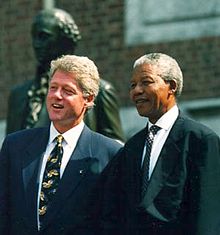
During the course of Mandela's presidency, a wide range of progressive social reforms were enacted, aimed at reducing long entrenched social and economic inequalities in South Africa. Free health care was introduced in 1994 for all children under the age of six together with pregnant and breastfeeding women making use of public sector health facilities (a provision extended to all those using primary level public sector health care services in 1996). The Reconstruction and Development Programme was launched, which invested in essential social services such as housing and health care. Increases in welfare spending were carried out, with public spending on welfare and social grants increased by 13% in 1996/97, 13% in 1997/98, and 7% in 1998/99. The government also introduced parity in grants for communities, including disability grants, child maintenance grants, and old-age pensions, which had previously been set at different levels for South Africa’s different racial groups.
The application of the child maintenance grant was extended to blacks in rural areas, who had been previously excluded from the system. A significant increase in public spending on education was carried out, with expenditure raised by 25% in 1996/97, 7% in 1997/98 and 4% in 1998/99. In addition, reproductive health services were expanded.
The Land Restitution Act of 1994 enabled people who had lost their property as a result of the Natives Land Act, 1913 to claim back their land, leading to the settlement of tens of thousands of land claims. The Land Reform Act 3 of 1996 safeguarded the rights of labour tenants who live and grow crops or graze livestock on farms. This legislation ensured that such tenants could not be evicted without a court order or if they were over the age of sixty-five.
The Skills Development Act of 1998 provided for the establishment of mechanisms to finance and promote skills development at the workplace. The Labour Relations Act of 1995 promoted workplace democracy, orderly collective bargaining, and the effective resolution of labour disputes. The Basic Conditions of Employment Act of 1997 improved enforcement mechanisms while extending a "floor" of rights to all workers, while the Employment Equity Act of 1998 was passed to put an end to unfair discrimination and ensure the implementation of affirmative action in the workplace.
3 million people were connected to telephone lines, 1.5 million children were brought into the education system, 500 clinics were upgraded or constructed, 2 million people were connected to the electricity grid, water access was extended to 3 million people, and 750,000 houses were constructed, housing nearly 3 million people in the process.
Compulsory schooling was introduced for African children between six and fourteen years, while free meals were provided for between 3.5 to 5 million school children.
The 1996 Mine Health and Safety Act (amended in 1997) was passed to improve health and safety safety conditions for miners, while a National Drug Policy was launched in 1996 to improve access to essential medicines.
The Welfare Laws Amendment Act of 1997 amended the Social Assistance Act of 1992 to provide for equality of access, uniformity and effective regulation of social assistance throughout South Africa, among other changes. Amendments to the Aged Persons Act in 1998, which provided for the establishment of management committees for homes for the elderly, to require reporting on the abuse of elderly persons, and to regulate the prevention of the abuse of elderly people.
The Prevention of Illegal Eviction from and Unlawful Occupation of Land Act of 1998 provided that no individual may be evicted from their home without a Court order after all relevant circumstances have been taken into account.
A National Development Agency was established in 1998, and was mandated to provide funds to civil society organizations to meet the developmental needs of poor communities, among other functions. The Extension of Security of Tenure Act of 1997 aimed at providing security of tenure to vulnerable occupants of land outside of urban areas. The legislation contained provisions which sought to create and support long-term security for vulnerable occupants while also safeguarding them from unfair eviction. The Land Reform (Labour Tenants) Act of 1996 safeguarded labour tenants and provided them with the right to claim land.
Amendments to the Compensation for Occupational Injuries and Diseases Act (COIDA) in 1997 ensured that the number of dependants of workers who tragically lost their lives as a result of work place accidents and diseases now had an extended right to compensation beyond the age of eighteen. In addition, workers were granted a full right to compensation "for any disease arising out of the course and scope of their employment as compensation will not be limited to diseases resulting from exposure to substances at the workplace or due to workplace practices." Amendments to the Insolvency Act in 1998 aimed to ensure that in bankruptcy cases preference would be given to workers "to ensure that monies owed to them takes precedence over the claims of other creditors."
Lockerbie trial
Mandela took a particular interest in helping to resolve the long-running dispute between Muammar al-Gaddafi's Libya and the U.S. and Britain over bringing to trial the two Libyans who were indicted in November 1991 and accused of sabotaging Pan Am Flight 103. The flight had crashed in the Scottish town of Lockerbie on 21 December 1988, with the loss of 270 lives. As early as 1992, Mandela informally approached U.S. President George H.W. Bush with a proposal to have the two indicted Libyans tried in a third country. Bush reacted favourably to the proposal, as did President François Mitterrand of France and King Juan Carlos I of Spain. However, British Prime Minister John Major rejected the idea, saying that his government did not have confidence in foreign courts. A further three years elapsed until Mandela's offer was repeated to Major's successor, Tony Blair, when Mandela visited London in July 1997.
A compromise solution was then agreed for a trial to be held at Camp Zeist in the Netherlands, governed by Scots law, and Mandela began negotiations with Colonel Gaddafi for the handover of the two accused ( Megrahi and Fhimah) in April 1999. On 31 January 2001, Fhimah was found not guilty, but Megrahi was convicted and sentenced to 27 years in a Scottish jail. Megrahi's initial appeal was turned down in March 2002, and Mandela visited him in Barlinnie prison on 10 June 2002, afterward calling Megrahi's isolation "psychological persecution" and calling for his transfer to a Muslim country. Megrahi was subsequently moved to Greenock jail and out of solitary confinement.
Retirement
| Apartheid in South Africa |
|---|
| Events and projects |
|
| Organisations |
|
| People |
|
| Places |
|
| Related topics |
|
Mandela became the oldest elected President of South Africa when he took office at the age of 75 in 1994. He decided not to stand for a second term and retired in 1999, to be succeeded by Thabo Mbeki.
After his retirement as President, Mandela went on to become an advocate for a variety of social and human rights organisations. He has expressed his support for the international Make Poverty History movement of which the ONE Campaign is a part. The Nelson Mandela Invitational charity golf tournament, hosted by Gary Player, has raised over twenty million rand for children's charities since its inception in 2000. This annual special event has become South Africa's most successful charitable sports gathering and benefits both the Nelson Mandela Children's Fund and Gary Player Foundation equally for various children's causes around the world.
Mandela is a vocal supporter of SOS Children's Villages, an international organisation dedicated to raising orphaned and abandoned children. Three organisations associated with Mandela have been established: the Nelson Mandela Foundation, the Nelson Mandela Children's Fund, and the Mandela Rhodes Foundation.
Post-retirement health
In July 2001 Mandela was diagnosed and treated for prostate cancer. He was treated with a seven-week course of radiation. In 2003 Mandela's death was incorrectly announced by CNN when his pre-written obituary (along with those of several other famous figures) was inadvertently published on CNN's web site due to a fault in password protection. In 2007 a fringe right-wing group distributed hoax email and SMS messages claiming that the authorities had covered up Mandela's death and that white South Africans would be massacred after his funeral. Mandela was on holiday in Mozambique at the time.
In June 2004, at age 85, Mandela announced that he would be retiring from public life. His health had been declining, and he wanted to enjoy more time with his family. Mandela said that he did not intend to hide away totally from the public, but wanted to be in a position "of calling you to ask whether I would be welcome, rather than being called upon to do things and participate in events. My appeal therefore is: Don't call me, I will call you." Since 2003, he has appeared in public less often and has been less vocal on topical issues.
Mandela's 90th birthday was marked across the country on 18 July 2008, with the main celebrations held at his home town of Qunu. A concert in his honour was also held in Hyde Park, London. In a speech to mark his birthday, Mandela called for the rich people to help poor people across the world. Despite maintaining a low-profile during the 2010 FIFA World Cup in South Africa, Mandela made a rare public appearance during the closing ceremony, where he received a "rapturous reception".
In January 2011, he was hospitalized for two and a half days for a respiratory infection. On 8 December 2012, he was hospitalized for a recurring lung infection, and had surgery to have gallstones removed a week later. He was released from the hospital on 26 December.
The Elders
On 18 July 2007, Mandela, Graça Machel, and Desmond Tutu convened a group of world leaders in Johannesburg to contribute their wisdom and independent leadership to address the world's toughest problems. Mandela announced the formation of this new group, The Elders, in a speech he delivered on the occasion of his 89th birthday.
"This group can speak freely and boldly, working both publicly and behind the scenes on whatever actions need to be taken,” Mandela commented. “Together we will work to support courage where there is fear, foster agreement where there is conflict, and inspire hope where there is despair."
The Elders are Martti Ahtisaari, Kofi Annan, Ela Bhatt, Lakhdar Brahimi, Gro Harlem Brundtland, Fernando Henrique Cardoso, Jimmy Carter, Graça Machel, Mary Robinson and Desmond Tutu (Chair). Mandela is an honorary Elder.
AIDS engagement
Since his retirement, one of Mandela's primary commitments has been to the fight against AIDS. He gave the closing address at the XIII International AIDS Conference in 2000, in Durban, South Africa. In 2003, he had already lent his support to the 46664 AIDS fundraising campaign, named after his prison number. In July 2004, he flew to Bangkok to speak at the XV International AIDS Conference.
Criticism of US and UK foreign policy
Nelson Mandela had strongly opposed the 1999 NATO intervention in Kosovo and called it an attempt by the world's powerful nations to police the entire world. In 2002 and 2003, Mandela criticised the foreign policy of US president George W. Bush in a number of speeches. Criticising the lack of UN involvement in the decision to begin the War in Iraq, he said, "It is a tragedy, what is happening, what Bush is doing. But Bush is now undermining the United Nations." Mandela stated he would support action against Iraq only if it is ordered by the UN. Mandela also insinuated that the United States may have been motivated by racism in not following the UN and its secretary-general Kofi Annan on the issue of the war. "Is it because the secretary-general of the United Nations is now a black man? They never did that when secretary-generals [sic] were white".
Mandela urged the people of the US to join massive protests against Bush and called on world leaders, especially those with vetoes in the UN Security Council, to oppose him. "What I am condemning is that one power, with a president who has no foresight, who cannot think properly, is now wanting to plunge the world into a holocaust." He attacked the United States for its record on human rights and for dropping atomic bombs on Japan during World War II. "If there is a country that has committed unspeakable atrocities in the world, it is the United States of America. They don't care." Nelson Mandela also harshly condemned British Prime Minister Tony Blair and referred to him as the "foreign minister of the United States".
Ismail Ayob court action
Ismail Ayob was a trusted friend and personal attorney of Mandela for over 30 years. In May 2005, Ayob was asked by Mandela to stop selling prints signed by Mandela and to account for the proceeds of their sale. This bitter dispute led to an extensive application to the High Court of South Africa by Mandela that year. Ayob denied any wrongdoing, and claimed that he was the victim of a smear campaign orchestrated by Mandela's advisors, in particular, lawyer George Bizos.
Ayob, George Bizos and Wim Trengove were trustees of the Nelson Mandela Trust, which was set up to hold millions of rands donated to Nelson Mandela by prominent business figures, including the Oppenheimer family, for the benefit of his children and grandchildren. Ayob later resigned from the Trust. In 2006, the two remaining trustees of the Nelson Mandela Trust launched an application against Ayob for disbursing money from the trust without their consent. In February 2007, Ayob promised to pay R700 000 to Mandela, which Ayob had transferred into trusts for Mandela's children, and apologised, although he later said that he was the victim of a "vendetta" by Mandela.
Zimbabwe and Robert Mugabe
In 2000, Mandela criticised Robert Mugabe, the president of Zimbabwe who has led the country since independence in 1980, referring to African leaders who had liberated their countries but had then overstayed their welcome. In his retirement, Mandela spoke out less often on Zimbabwe and other international and domestic issues, sometimes leading to criticism for not using his influence to greater effect to persuade Mugabe to moderate his policies. His lawyer George Bizos revealed that Mandela has been advised on medical grounds to avoid engaging in stressful activity such as political controversy. Nonetheless, in 2007, Mandela attempted to persuade Mugabe to leave office "sooner than later", with "a modicum of dignity", before he was hounded out like Augusto Pinochet. Mugabe did not respond to this approach. In June 2008, at the height of the crisis over the Zimbabwean presidential election, Mandela condemned the "tragic failure of leadership" in Zimbabwe.
Acclaim

Most South Africans consider Mandela "the father of nation". Eve Fairbanks of Newsweek said "Mandela rightly occupies an untouched place in the South African imagination. He's the national liberator, the saviour, its Washington and Lincoln rolled into one".
In November 2009, the United Nations General Assembly announced that Mandela's birthday, 18 July, is to be known as " Mandela Day" to mark his contribution to world freedom. Individuals, communities and organisations are asked to donate 67 minutes to doing something for others, commemorating the 67 years that Nelson Mandela gave to the struggle for social justice.
Orders and decorations
Mandela has received many South African, foreign and international honours, including the Nobel Peace Prize in 1993 (which was shared with de Klerk); appointment as a Baliff Grand Cross of the Order of St. John and to the Order of Merit, both personal gifts of Queen Elizabeth II; and the Presidential Medal of Freedom from George W. Bush. In July 2004, the city of Johannesburg bestowed its highest honour on Mandela by granting him the freedom of the city at a ceremony in Orlando, Soweto.
As an example of his foreign acclaim, during his tour of Canada in 1998, he was made an honorary Companion of the Order of Canada, and 45,000 school children greeted him with adulation at a speaking engagement in the SkyDome in the city of Toronto. In 2001, he was the first living person to be made an honorary Canadian citizen (the only previous recipient, Raoul Wallenberg, was awarded honorary citizenship posthumously).
In 1990 he received the Bharat Ratna Award from the government of India and also received the last-ever Lenin Peace Prize from the Soviet Union. In 1992 he was awarded the Atatürk Peace Award by Turkey. He refused the award, citing human rights violations committed by Turkey at the time, but later accepted the award in 1999. In 1992 he received the Nishan-e-Pakistan, the highest civil service award of Pakistan.
Musical tributes
Many artists have dedicated songs to Mandela. One of the most popular was from The Special AKA who recorded the song " Free Nelson Mandela" in 1983, which Elvis Costello also recorded and had a hit with. Stevie Wonder dedicated his 1985 Oscar for the song " I Just Called to Say I Love You" to Mandela, resulting in his music being banned by the South African Broadcasting Corporation. In 1985, Youssou N'Dour's album Nelson Mandela was the Senegalese artist's first U.S. release. Other artists who released songs or videos honoring Mandela include Johnny Clegg, Hugh Masekela, Brenda Fassie, Beyond, Nickelback, Raffi, and Ampie du Preez and AB de Villiers.
On 11 June 1988, the Nelson Mandela 70th Birthday Tribute event was produced by Tony Hollingsworth and broadcast to a worldwide audience of 600 million people. The event had three main objectives, in addition to the obvious demand that Mandela should be released: to stop radio and television broadcasters from referring to Mandela as a "terrorist"; to position him as a leader; and to obtain ratings figures high enough to motivate politicians worldwide to call for Mandela's release. The event was staged at London's Wembley Stadium and involved 83 major artists. Participants included Jerry Dammers, Simple Minds, Santana, Tracy Chapman, Salif Keita, and Whitney Houston.
Shortly after Mandela's release from prison in February 1990, Hollingsworth produced a second global broadcast event, Nelson Mandela: An International Tribute for a Free South Africa, which reached a worldwide audience of 500 million people. This event, held on 16 April 1990, was regarded by Mandela as an official international reception. Mandela was on stage for 45 minutes, of which the first eight minutes was taken up by a standing ovation. He called for the maintenance of sanctions against South Africa and for continued pressure from people around the world for the abolition of the apartheid system.
Published biographies
Mandela's autobiography, Long Walk to Freedom, was published in 1994, an extended version of No Easy Walk to Freedom, published by Heinemann in 1965. Mandela had begun work on it secretly while in prison.
In 1995, one of Mandela's former warders, James Gregory, published a biography of Mandela titled Goodbye Bafana. Biographer Anthony Sampson maintained that Mandela had not known Gregory well, but that Gregory censored the letters sent to the future president and thus discovered the details of Mandela's personal life. Sampson also stated that other warders suspected Gregory of spying for the government and that Mandela considered suing Gregory.
Cinema and television
In the final scene of the 1992 film Malcolm X, Mandela appears as a schoolteacher in a Soweto classroom and recites a portion of one of Malcolm X's speeches. The 1997 film Mandela and de Klerk, starring Sidney Potier as Mandela, told the story of Mandela's release from prison. Goodbye Bafana, a 2007 feature film, starred Dennis Haysbert as Mandela and chronicled Mandela's relationship with prison guard James Gregory. In the 2009 BBC television film Mrs Mandela, Nelson Mandela was portrayed by David Harewood, and Sophie Okonedo played Winnie Mandela.
Mandela and Springboks captain François Pienaar are the focus of a 2008 book by John Carlin, Playing the Enemy: Nelson Mandela and the Game that Made a Nation, that spotlights the role of the 1995 Rugby World Cup win in post-apartheid South Africa. The film adaptation, titled Invictus, featured Morgan Freeman as Mandela.
Statues and civic tributes
On 30 April 2001, Nelson Mandela Gardens in Millennium Square, Leeds was officially opened and Nelson Mandela was awarded the freedom of the city and awarded a commemorative 'golden owl' (the heraldic symbol of Leeds). On 31 March 2004, Sandton Square in Johannesburg was renamed Nelson Mandela Square, after a 6-metre statue of Nelson Mandela was installed on the square.
On 29 August 2007, a statue of Nelson Mandela was unveiled at Parliament Square in London by Richard Attenborough, Ken Livingstone, Wendy Woods (widow of Donald Woods), and Gordon Brown. The campaign to erect the statue was started in 2000 by the late Donald Woods, a South African journalist driven into exile because of his anti-apartheid activities. Mandela stated that it represented not just him, but all those who have resisted oppression, especially those in South Africa.
On 27 August 2008, a statue of Nelson Mandela was unveiled at Groot Drakenstein Correctional Centre, formerly Victor Verster Prison, near Cape Town. It stands on the spot where Mandela was released from the prison after his long captivity.
Political ideology
Biographer David James Smith asserted that politically, Mandela was "a democrat, and a socialist." Mandela was influenced by Marxism, and advocated " scientific socialism." Biographer Anthony Sampson noted that although rejecting descriptions that he was a communist, Mandela was "openly opposed to capitalism, private land-ownership and the power of big money."
Personal life
Mandela was known to have a "hot temper", and was "physically undemonstrative" with his children, also being a "demanding, ambitious father". Mandela has been married three times, has fathered six children, has twenty grandchildren, and a growing number of great-grandchildren. He is grandfather to Chief Mandla Mandela.
First marriage
Mandela's first marriage was to Evelyn Ntoko Mase who, like Mandela, was also from what later became the Transkei area of South Africa, although they actually met in Johannesburg. The couple broke up in 1957 after 13 years, divorcing under the multiple strains of his constant absences, devotion to revolutionary agitation, and the fact she was a Jehovah's Witness, a religion which requires political neutrality. Mase died in 2004. The couple had two sons, Madiba Thembekile (Thembi) (1946–1969) and Makgatho Mandela (1950–2005), and two daughters, both named Makaziwe Mandela (known as Maki; born 1947 and 1953). Their first daughter died aged nine months, and they named their second daughter in her honour. All their children were educated at the United World College of Waterford Kamhlaba. Thembi was killed in a car crash in 1969 at the age of 23, while Mandela was imprisoned on Robben Island, and Mandela was not allowed to attend the funeral. Makgatho died of AIDS in 2005, aged 54.
Second marriage
Mandela's second wife, Winnie Madikizela-Mandela, also came from the Transkei area, although they, too, met in Johannesburg, where she was the city's first black social worker. They had two daughters, Zenani (Zeni), born 4 February 1958, and Zindziswa (Zindzi) Mandela-Hlongwane, born 1960. Zindzi was only 18 months old when her father was sent to Robben island. Later, Winnie would be deeply torn by family discord which mirrored the country's political strife; while her husband was serving a life sentence in the Robben Island prison, her father became the agriculture minister in the Transkei. The marriage ended in separation (April 1992) and divorce (March 1996), fueled by political estrangement.
Mandela was still in prison when his daughter Zenani was married to Prince Thumbumuzi Dlamini in 1973, elder brother of King Mswati III of Swaziland. Although she had vivid memories of her father, from the age of four up until sixteen, South African authorities did not permit her to visit him. In July 2012, Zenani was appointed ambassador to Argentina, becoming the first of Mandela's three remaining children to enter public life.
Third marriage
Mandela remarried on his 80th birthday in 1998, to Graça Machel née Simbine, widow of Samora Machel, the former Mozambican president and ANC ally who was killed in an air crash 12 years earlier.


